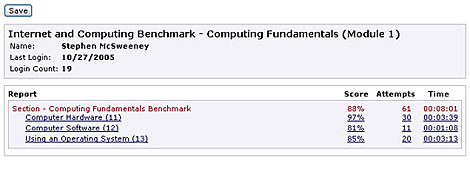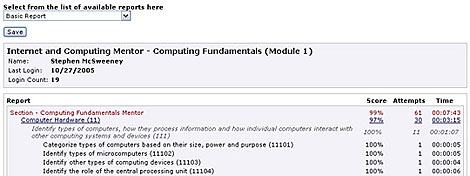Internet & Computing Benchmark and Mentor Frequently Asked Questions
Q: What are the "Levels of Assist"?
A: The Internet & Computing Mentor provides three levels of assistance to the individual during the assessment. The first time a candidate answers a question incorrectly, they will be offered the opportunity to try again. The second time they miss it, they will be given a hint. If a question is answered incorrectly a third time, the system will graphically guide them in finding the correct process to perform a task. Administrators have the flexibility to turn the levels of assist on or off.
Q: What type of reporting is available to help me understand my students' level of competency?
A: The Internet & Computing Benchmark tool will provide reporting at the domain level.

The Internet & Computing Mentor provides reporting at the skill set level. This allows instructors to appropriately gauge the skill level of their students or employees in detail.

Reports can be generated by individual, classroom, school, or district so administrators can accurately gauge their students' level of understanding and which areas need to be addressed. This provides an invaluable tool in developing programs, accurately determining placement, evaluating a program’s success and measuring the year over year progress of your programs.
Q: Why did Certiport develop this tool?
A: For two reasons. First, these are the only assessments based on globally recognized and accepted digital literacy standards. Regardless of where you are, these assessments will accurately gauge an individual’s digital knowledge based on standards developed by hundreds of experts from around the world. Second, there is an increasing demand in the market for a single-solution product. With these tools, Certiport is now able to support all steps of the certification pathway including: pre-assessment, training, post-assessment and certification. Schools, businesses and government agencies can now move individuals from digital isolation to digital literacy with one solution.
Q: How does it differ from other assessment materials?
A: The Internet & Computing Benchmark is the only assessment that covers all of the skills needed to be considered digitally literate. These objectives are based on the IC 3 global standard for digital literacy which was created by the Global Digital Literacy Council (GDLC). The GDLC is comprised of an international group of subject matter experts who have gathered together to ensure the creation of a single standard by which digital literacy can be measured.
The Internet & Computing Mentor is unique among all assessment tools because it generates custom study guides that map to multiple courseware options for prescriptive/just-in-time learning. It also provides graphical, interactive learning through three levels of assistance to allow instant remediation.
Q: What are the benefits of the Benchmark and Mentor?
A: The Internet & Computing Benchmark accurately assesses the level of digital knowledge possessed by an individual. Once individuals have completed the assessment, the dynamic suite of reporting tools provide government agencies, corporations and academic institutions with detailed reports that clearly illustrate the current status of skill sets, the required remediation, student progress and the overall level of digital literacy among their participants.
The Internet & Computing Mentor delivers extensive reporting capabilities down to the individual assessment questions. This detailed knowledge helps administrators develop educational programs, track progress and demonstrate the success of those programs and fully prepare individuals to excel in their lives through the efficient use of technology. As noted above, the Mentor also provides advanced tutoring by offering three levels of assistance. In addition, custom study guides--with the option to map to certified courseware--are created based on the questions an individual misses. These study guides enable administrators to develop prescriptive/just-in-time learning so individuals receive training only on the skills they are lacking.